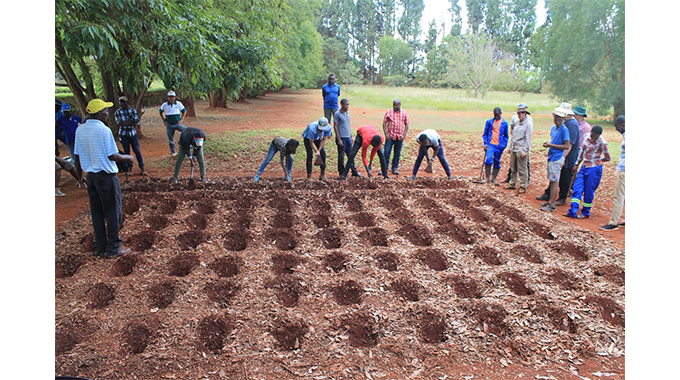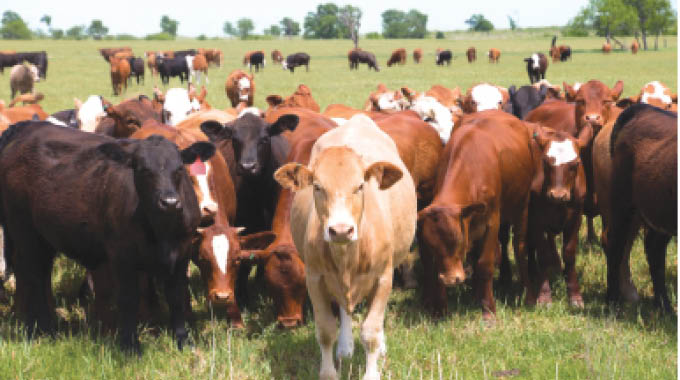
The Sunday News

Rutendo Nyeve, Sunday News Correspondent
AFRICA has the potential to feed itself and be a recognised exporter of food to all parts of the world if it harnesses all the gifts of natural geography that are at its disposal, but there has been a yawning gap and reluctance in promoting smart agricultural techniques that speak to global changes in climate, an agricultural researcher has noted.
He submits that the best way for Africa to feed the world is to teach farmers new practices and build technology around agriculture and its value chain so that the farmer benefits from being productive.
Inspired by the need to build resilient farming systems in a rural set up from where the nation could be fed through smart farming practices, a young Zimbabwean agriculture researcher Ranga Huruba (35) is researching communal and small-scale beef production for rural residents.

Mr Ranga Huruba
Huruba recently toured Southern Alberta, Canada with some of the world’s most curious farmers under a Nuffield Scholarship and says Zimbabwe has a strong agricultural foundation which only needs optimisation and an improvement of models around market access, funding access, technology, training and genetics.
Huruba is a research manager for Debshan Ranch, an 8 000 – herd private cattle and wildlife operation in Shangani in Matabeleland South Province. He says it is important for those in the agricultural sector to take advantage of the upward economic trajectory in key economic sectors provided for under the National Development Strategy 1 (NDS1).
NDS1 provides for the funding and continued implementation of transformative measures like the Pfumvudza/Intwasa programme amongst a cocktail of other initiatives that have spearheaded growth of these sectors.

Pfumvudza/Intwasa training
With the new dispensation emphasising the need for Zimbabweans to be masters of their own destinies through the philosophy ‘Nyika inovakwa nevene vayo/ilizwe lakhiwa ngabaninilo’, Huruba has joined other progressive Zimbabweans in ensuring he contributes towards the growth of the country through adding value in the agricultural sector through various initiatives.
The recent tour of Canada was part of his quest to learn different farming practices and shared some of his experiences and lessons with Sunday News which can come in handy in ensuring the country reclaims its bread basket status in the Southern African region.
“We could build resilience in smallholder farming systems having seen how our family farm failed to keep up with changing times, I felt there was need to improve rural and village economies. I want to see an average Zimbabwean and African prosper. We should not hustle to fail or suffer but to develop and prosper as a country and a region. We need to keep on improving technologies, market linkages and our genetics,” said Huruba on what inspired him to apply for the tour.
“The tour exposed me to different cultures and ways of doing things which is from leadership management, operations management, social management and insights into how farmers interact among themselves as well as associations and government. The whole experience was a positive one and gets one to realize how much work there is for all of us in order to feed our global growing population.”
Huruba notes that Africa has the advantage of good climatic conditions, abundant land and the major resource which is the people that have a good work ethic.
As such he said, the continent needs to harness all and optimise production on every square inch so that it claims its spot on the world production quota.
“Africa needs opportunity, not pity, therefore we should move away from aid and start trading through focused engagement and intentional growth. The global population is growing and we either have to depend on a few commercial farmers to increase their production on a finite land resource or we make a bigger chunk of the population (communal, rural and small scale – Africa) to be self-sustaining through resilient intensive conservation farming. I would go for the later for it brings dignity and pride back to the family unit especially an African family unit,” said Huruba.
The philosophy around smart agriculture is that of sustainability, regenerative, and holistic techniques that revolve around zero harm to the environment as one is producing goods and services.

Livestock
As such, Huruba says, “Increasing production without detrimental effects to the environment is the challenge and we should revisit our indigenous knowledge systems and take a leaf out of that book because the first world is cycling back to those practices and yet we are still chasing what they are leaving instead of moving in the direction of adopting and using our own knowledge systems that promote smart conservation agriculture.”
Coming to livestock production, Huruba said: “Zimbabwe has about 5 million cattle and 3 million of those are outside commercial production systems.
“They are also being run in multi species systems for example in a rural setting (goats, chickens, pigs, etc.) So, the foundation is there and all we need is optimization and an improvement model around market access, funding access, technology, training and genetics to keep on improving our herds and ensure that we remain unique in our natural beef production because that is what the world is looking for.”
The Nuffield Scholarship requires one to generate a report or project that should have a national impact but with a global focus that mainstreams and helps farmers and governments. As such his report is set to benefit the country in various ways. @nyeve14



